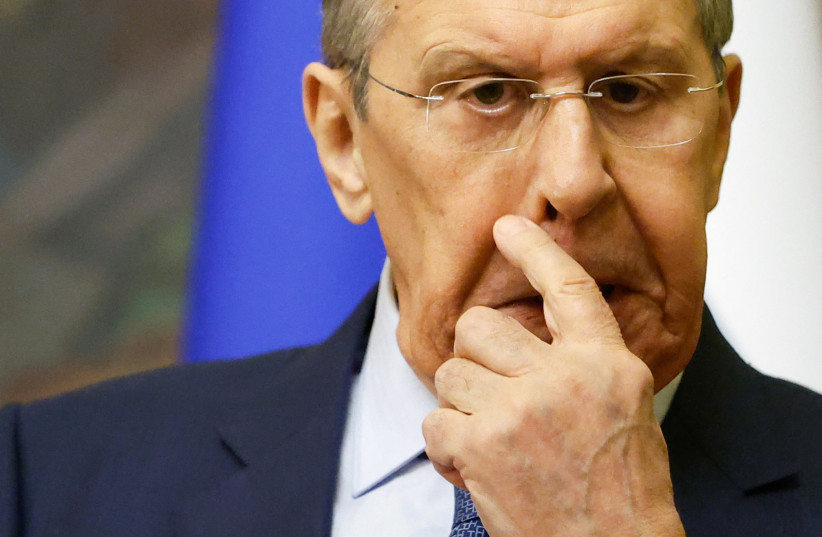Tehran will not compromise on its red lines in the nuclear negotiations with Western powers, President Ebrahim Raisi said on Tuesday.
“The government pursues nuclear negotiations in full accordance with the principles and framework set by the supreme leader [Ali Khamenei], it has not and will not back down on any of these red lines,” the semiofficial Fars news agency quoted the Iranian president as saying.
Reports that an agreement is near are heating up, but the Russian foreign minister’s statement that Moscow wants written guarantees that Ukraine-related sanctions won’t prevent it from trading with Tehran sparked an angry response from Iranian officials and was dismissed by US officials.
Sergey Lavrov said on Saturday that his country is demanding assurances from the US before supporting a renewed Iran nuclear accord.
“We requested that our US colleagues … give us written guarantees at the minimum level of secretary of state that the current [sanctions] process launched by the US will not in any way harm our right to free, fully-fledged trade and economic and investment cooperation and military-technical cooperation with Iran,” Lavrov said at a news conference in Moscow.

Lavrov’s comments come as Western governments are imposing a battery of crippling economic sanctions on Russia for its invasion of Ukraine.
“From our point of view, if Iran agrees, this document can already be launched into the acceptance process,” he said.
Lavrov said there are “problems that have appeared recently from the point of view of Russia’s interests,” due to concerns over the terms of the deal being discussed in Vienna regarding Moscow’s involvement in the civilian nuclear sector in Iran and arms sales to Tehran.
Russia’s demand triggered rare public criticism by Iran, whose foreign minister, Hossein Amir-Abdollahian, said the Islamic Republic would not permit “any foreign elements to undermine its national interests.” Iran is reportedly waiting for an explanation from Russia over its latest diplomatic maneuver.
Iranian officials decried Moscow’s demands, saying “there is an understanding that by changing its position in [the] Vienna talks, Russia wants to secure its interests in other places. This move is not constructive for [the] Vienna nuclear talks.”
US Secretary of State Antony Blinken described his Russian counterpart’s comments as “irrelevant.”
Blinken rejected Lavrov’s demand for linkage, saying the sanctions on Russia over its invasion of Ukraine “have nothing to do with the Iran nuclear deal.”
Yaakov Lappin, a research associate at the Begin-Sadat Center for Strategic Studies at Bar-Ilan University in Ramat Gan, near Tel Aviv, told The Media Line the Russian invasion has already impacted the progress toward reaching an accord.
Russia has conditioned support for an agreement on an American guarantee that its “trade, investment and military-technical cooperation with Iran will not be hindered by Western sanctions,” thereby creating a “delay mechanism that is based on a linkage between the Iran deal and the diplomatic-economic fallout from its invasion of Ukraine,” says Lappin.
Prof. Shmuel Sandler, a professor of political science and president of Emuna Ephrata College in Jerusalem, told The Media Line that if the Russians “want to make problems they can.
“They can put obstacles in the way of progress in talks,” he said. “Let’s not forget who got out of the deal first; it wasn’t Russia, not the Europeans, and not China, it was the United States.”
Sandler says if the Russians insist on their demands, “this will delay the signing of an agreement.”
The war in Ukraine did divert attention from the negotiations in Vienna, he said, adding that the “only fear is that if they don’t reach an agreement soon, Iran can get very close to finishing production of enriching uranium to the level that makes it a nuclear country. That is dangerous.”
Sandler argues that when push comes to shove, Russia doesn’t want a nuclear Iran.
“Deep down Russia is not interested in an Islamic country having nuclear weapons; we must understand that they [the Russians] have a big Muslim minority,” the professor says.
Then-US President Donald Trump unilaterally withdrew the US from the nuclear accord in 2018, saying it was not tough enough in curtailing Iran’s weapons ambitions. The Trump Administration then reimposed heavy economic sanctions.
Talks on reviving the pact, the Joint Comprehensive Plan of Action, restarted in Vienna in November after several months’ hiatus due to last June’s presidential elections in Iran. The talks include Iran, Britain, China, France, Germany, and Russia directly, and the United States indirectly.
The 2015 Iran agreement offered Tehran sanctions relief in exchange for promised curbs on its nuclear program. Sanctions have badly hit Iran’s oil and gas revenues and the Tehran government is eager for new investment and customers.
If the US imposes sanctions on Russian oil imports it would be catastrophic for the global economy, unless other oil-producing states fill the gap.
On Monday, oil contracts soared to a near 14-year high as they reached $139.13 per barrel before cooling to just over $123.
US gasoline prices climbed to their highest level in 13 years, with the average price for a gallon of regular gas hitting $4 earlier this week, the most since 2008.
There are “concerns in Russia that Iran will be able to fill in gaps in the oil market following a ban in the West on Russian oil imports. Once sanctions on Iran are rolled back, Iran will be able to export a high volume of oil, bringing down prices and helping to offset shortages and price hikes that would result from bans on Russian oil,” says Lapin.
The US imports about 8% of its oil and other petroleum products, and no natural gas, from Russia. The European Union, however, buys about a quarter of its petroleum and 40% of its natural gas from Russia.
